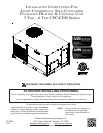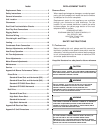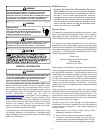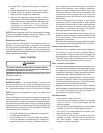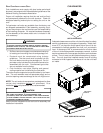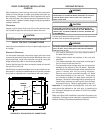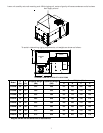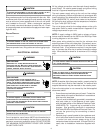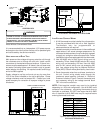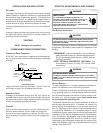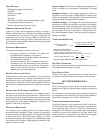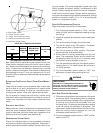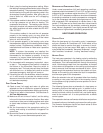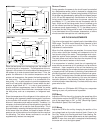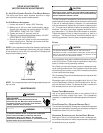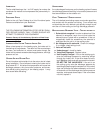
3
T
HIS
UNIT
MUST
NOT
BE
USED
AS
A
“
CONSTRUCTION
HEATER
”
DURING
THE
FINISHING
PHASES
OF
CONSTRUCTION
ON
A
NEW
STRUCTURE
. T
HIS
TYPE
OF
USE
MAY
RESULT
IN
PREMATURE
FAILURE
OF
THE
UNIT
DUE
TO
EXTREMELY
LOW
RETURN
AIR
TEMPERATURES
AND
EXPOSURE
TO
CORROSIVE
OR
VERY
DIRTY
ATMOSPHERES
.
WARNING
HIGH VOLTAGE!
D
ISCONNECT
ALL
POWER
BEFORE
SERVICING
OR
INSTALLING
THIS
UNIT
. M
ULTIPLE
POWER
SOURCES
MAY
BE
PRESENT
. F
AILURE
TO
DO
SO
MAY
CAUSE
PROPERTY
DAMAGE
,
PERSONAL
INJURY
OR
DEATH
.
WARNING
WARNING
TO PREVENT THE RISK OF PROPERTY DAMAGE, PERSONAL INJURY, OR DEATH,
DO NOT STORE COMBUSTIBLE MATERIALS OR USE GASOLINE OR OTHER
FLAMMABLE LIQUIDS OR VAPORS IN THE VICINITY OF THIS APPLIANCE.
GENERAL INFORMATION
T
O
PREVENT
PROPERTY
DAMAGE
PERSONAL
INJURY
OR
DEATH
,
DUE
TO
FIRE
,
EXPLOSIONS
,
SMOKE
,
SOOT
,
CONDENSATION
,
ELECTRIC
SHOCK
OR
CARBON
MONOXIDE
,
THIS
UNIT
MUST
BE
PROPERLY
INSTALLED
,
REPAIRED
,
OPERATED
,
AND
MAINTAINED
.
WARNING
This unit is approved for outdoor installation ONLY. Rated
performance is achieved after 72 hours of operation. Rated
performance is delivered at the specified airflow. See out-
door unit specification sheet for split system models or prod-
uct specification sheet for packaged and light commercial
models. Specification sheets can be found at
www.goodmanmfg.com for Goodman
®
brand products or
www.amana-hac.com for Amana
®
brand products. Within
either website, please select the residential or commercial
products menu and then select the submenu for the type of
product to be installed, such as air conditioners or heat
pumps, to access a list of product pages that each contain
links to that model’s specification sheet.
To assure that your unit operates safely and efficiently, it must
be installed, operated, and maintained in accordance with
these installation and operating instructions, all local building
codes and ordinances.
EPA REGULATIONS
IMPORTANT: THE UNITED STATES ENVIRONMENTAL PROTECTION
AGENCY (EPA) HAS ISSUED VARIOUS REGULATIONS REGARDING
THE
INTRODUCTION AND DISPOSAL OF REFRIGERANTS IN THIS UNIT.
FAILURE TO FOLLOW THESE REGULATIONS MAY HARM THE
ENVIRONMENT
AND CAN LEAD TO THE IMPOSITION OF SUBSTANTIAL
FINES
. BECAUSE REGULATIONS MAY VARY DUE TO PASSAGE OF NEW
LAWS
, WE SUGGEST A CERTIFIED TECHNICIAN PERFORM ANY WORK
DONE
ON THIS UNIT. SHOULD YOU HAVE ANY QUESTIONS PLEASE
CONTACT
THE LOCAL OFFICE OF THE EPA.
NATIONAL CODES
This product is designed and manufactured to permit instal-
lation in accordance with National Codes. It is the installer’s
responsibility to install the product in accordance with Na-
tional Codes and/or prevailing local codes and regulations.
The heating and cooling capacities of the unit should be
greater than or equal to the design heating and cooling loads
of the area to be conditioned. The loads should be calculated
by an approved method or in accordance with ASHRAE Guide
or Manual J - Load Calculations published by the Air Condi-
tioning Contractors of America.
Obtain from:
American National Standards Institute
1430 Broadway
New York, NY 10018
System design and installation should also, where applicable,
follow information presented in accepted industry guides such
as the ASHRAE Handbooks. The manufacturer assumes no
responsibility for equipment installed in violation of any code
or regulation. The mechanical installation of the packaged
roof top units consists of making final connections between
the unit and building services; supply and return duct con-
nections; and drain connections (if required). The internal
systems of the unit are completely factory-installed and tested
prior to shipment.
Units are generally installed on a steel roof mounting curb
assembly which has been shipped to the job site for installa-
tion on the roof structure prior to the arrival of the unit. The
model number shown on the unit’s identification plate identi-
fies the various components of the unit such as refrigeration
tonnage, heating input and voltage.
Carefully inspect the unit for damage including damage to
the cabinetry. Any bolts or screws which may have loosened
in transit must be re-tightened. In the event of damage, the
receiver should:
1. Make notation on delivery receipt of any visible
damage to shipment or container.
2. Notify carrier promptly and request an inspection.
3. In case of concealed damage, carrier should be
notified as soon as possible-preferably within 5 days.
4. File the claim with the following supporting documents:



